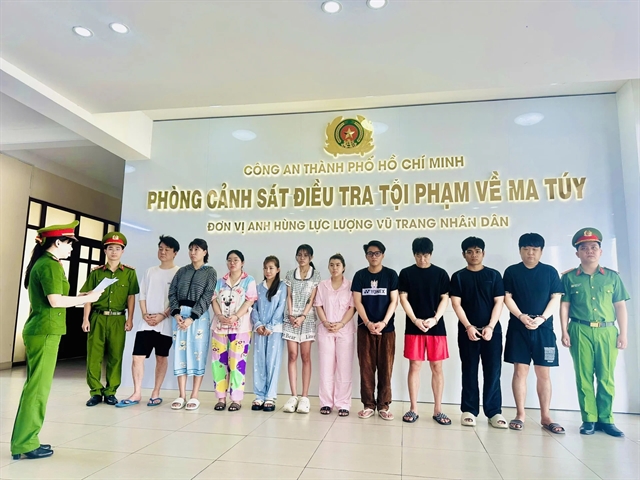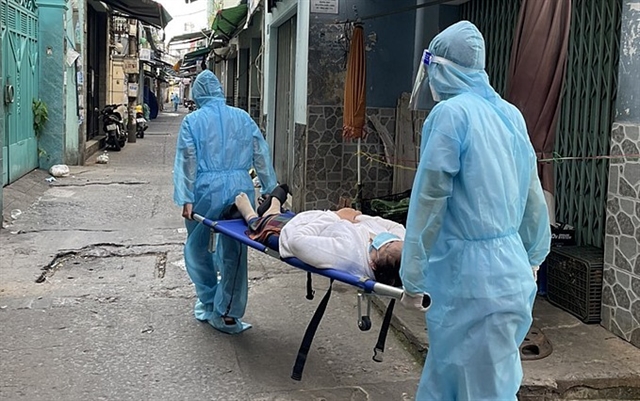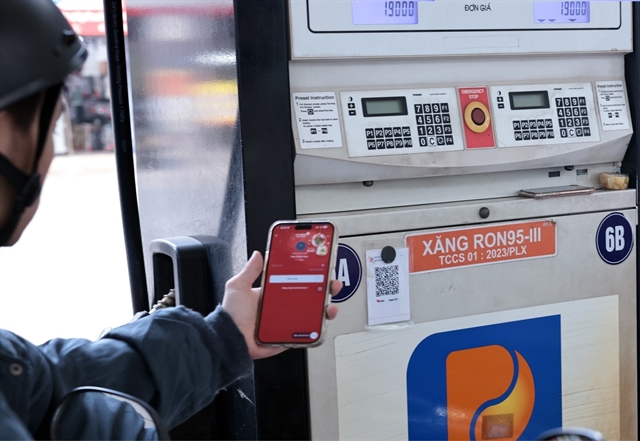 Society
Society

Củ Chi District and District 7 in HCM City have kept the COVID-19 outbreak under control thanks to strict and early management of infected cases, timely emergency care and an increase in the number of treatment beds.

|
| Medical forces in Tân Hưng Ward in District 7 provide COVID-19 patients with prompt support. Photo courtesy of vnexpress.net |
HCM CITY — Củ Chi District and District 7 in HCM City have kept the COVID-19 outbreak under control thanks to strict and early management of infected cases, timely emergency care and an increase in the number of treatment beds.
Secretary of the HCM City Party Committee Nguyễn Văn Nên said a pilot "new normal” scheme for HCM City after September 15 will first operate in the two districts.
At an online meeting of the city Party Committee last Monday, Nên agreed with the HCM City’s Steering Committee of Epidemic Prevention and Control that District 7 and Củ Chi District have basically controlled the COVID-19 epidemic and chose the two districts to pilot a new scheme of operation for HCM City after September 15.
The outlying district of Củ Chi has recorded over 6,000 cases of COVID-19, most of which have recovered. Very few cases have become severe.
Chairman of the district People’s Committee Phạm Thị Thanh Hiền said that Củ Chi had stayed alert and developed a response strategy to minimise the number of deaths when the fourth wave broke out in June.
Separation of positive COVID-19 cases has been Củ Chi District’s priority. While many were encouraged to visit the nearest medical facilities for an examination, some cases isolating at home have been closely monitored with support from doctors and volunteers.
Củ Chi stressed the importance of “remote interception” in reducing morbidity and morality rates among infected cases.
About 10 mobile medical teams were formed in many wards to take care of COVID-19 patients and people with other conditions isolating at home.
Isolation zones have operated as nursing areas, creating comfortable conditions for patients during treatment.
Dr Trương Tấn Hùng from the Củ Chi District Medical Centre said that a relaxed and optimistic mindset is beneficial to patients' recovery.
Isolation areas in Củ Chi District initially received and classified infected patients based on their level of illness and transferred them to upper-level hospitals offering COVID-19 treatment.
However, due to overloading at upper-level hospitals, the area has been converted to a district hospital with COVID-19 treatment for patients with mild to no symptoms.
Doctors there have quickly mobilised necessary equipment, drugs, first aid kits, oxygen tanks and operators to provide timely emergency care to seriously ill patients.
Hiền added that many volunteers were joining hands to help the medical force.
“Many teachers cooked lemongrass juice for infected cases on a daily basis, while young and healthy asymptomatic patients helped monitor elderly patients’ health staying in the same room in an effort to reduce the workload for doctors and nurses,” Hiền said.
Efforts to invest in low-level care kept the rate of seriously ill patients in Củ Chi at 3.5 per cent, about 114 cases of the more than 3,200 cases in concentrated isolation zones in HCM City. More than 10 people have died.
Deputy Health Minister Nguyễn Trường Sơn praised Củ Chi District’s efforts to maintain its green zone status and ensure quality of life for infected cases.
Similarly, District 7 has taken the initiative to take care of infected patients from the beginning, helping to limit the morality rate.
Previously, the district recorded 10 to 12 deaths per day. However, the number of deaths had fallen to one or two as of late August, while the average number of deaths per day in HCM City was more than 260.
The chairman of District 7 People’s Committee, Hoàng Minh Tuấn Anh, said in early May when the city required each district to have about 200 treatment beds, District 7 had prepared 33 facilities with about 3,400 beds capable of separating infected cases from the community. At the same time, a specialised hospital with COVID-19 treatment, consisting of 600 treatment beds and 150 emergency beds, was built as well.
By the beginning of August, when the number of infected cases in HCM City had exceeded 100,000 and hospitals were overloaded with patients, District 7 pioneered the operation of a community health system in 10 wards to promptly support new cases in isolation areas.
Each ward has a team of 10 to 15 medical staff and volunteers, two hotlines, ambulances, medical equipment, wheelchairs and stretchers to help locals in small alleys.
They have been able to take care of over 2,500 patients and 1,800 patients with suspected illness at home.
District 7 has also established 34 mobile medical stations with 83 doctors, 272 volunteers and medical staffs to provide treatment and primary care for common diseases. Since August 20, about 2,500 cases have been assisted and 86 locals have been transferred to designated hospitals.
Dr Nguyễn Thị Thu Nga, deputy director of District 7 Hospital, said that medical teams were trying to keep in touch with patients at home, which has helped reduce the number of severe cases, and thus the mortality rate.
Patients with moderate to severe symptoms are being treated at the 3,000-bed Hospital 16, the Intensive Care Centre (ICU) at Bạch Mai Hospital with 500 beds, District 7 Hospital and some private hospitals.
When the number of critically ill patients increased in the early days of August, the Intensive Care Centre, which just went into operation, has solved the overloading problem.
About 70 per cent of patients from lower levels transferred to this hospital required mechanical ventilation. Support in terms of manpower and machinery from ICU has helped more than 200 patients recover.
In order to share the burden with the city, a hospital offering COVID-19 treatment in District 7 has installed a 32-tonne oxygen tank to provide healthcare for hundreds of patients, instead of having to change hundreds of bottles of oxygen every day.
Since April 27, HCM City has recorded more than 265,000 COVID-19 cases. —- VNS




